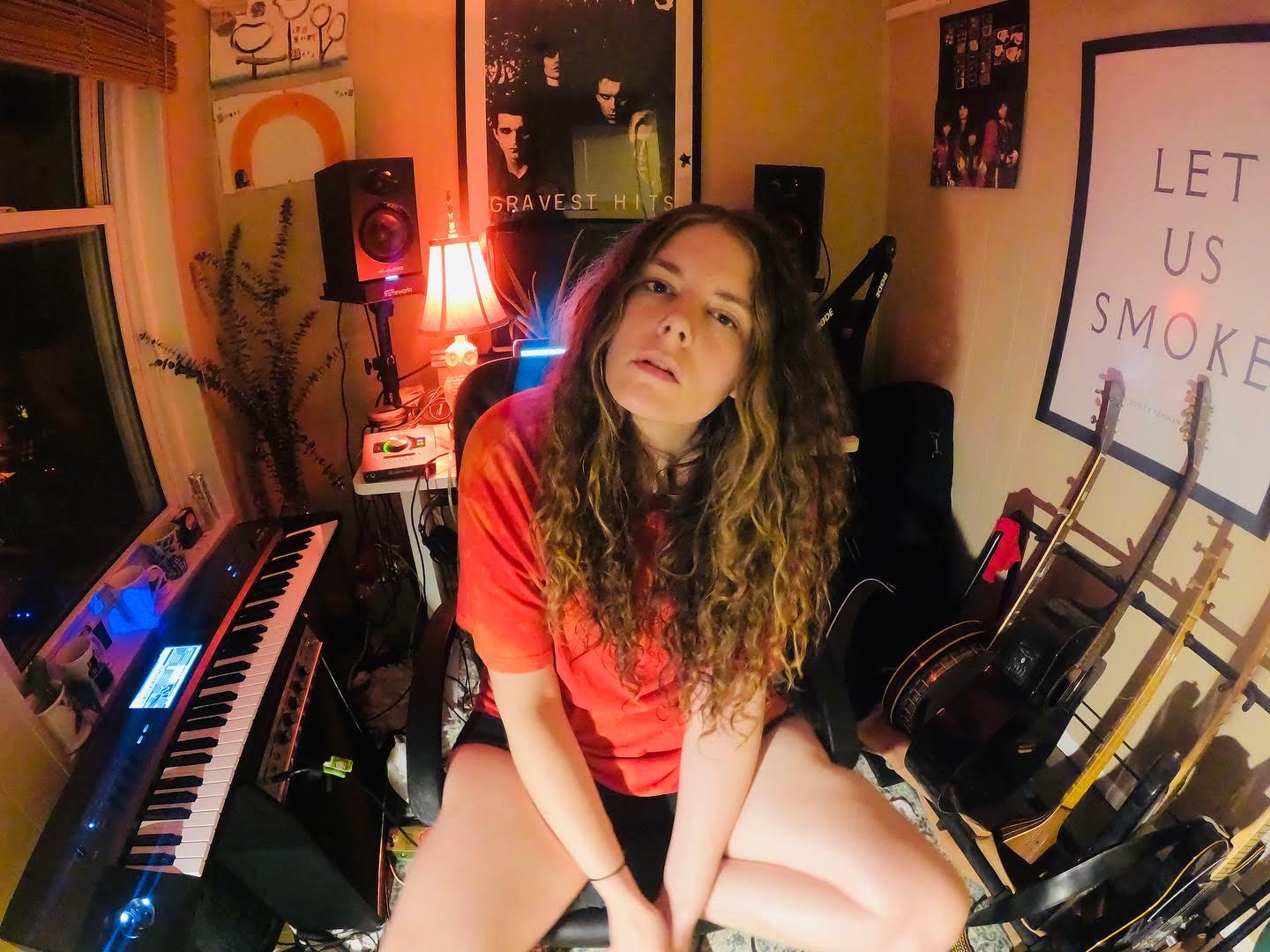For this week’s Home Studio Stories, we chatted with Katie Hackett of The Lunar Year. If you haven’t checked out the live session we did with them, LISTEN TO IT RIGHT NOW because it slaps.
…Okay, now that you’re back from that, hear what Katie has to say about the wild world of DIY music and why she believes you can make music out of anything – even a rock or an old iron.
I know you’re working on new music right now. Are you recording all of that in the home studio, or are you doing studio time?
It’s all home recorded. Most of it was engineered at Erik’s house. Erik Kramer, my bass player. Between the whole band, we kind of combined all of our gear. Erik has a lot more gear than me, but I brought my interface over and had some microphones. We kind of just made a studio set up and he has a really good space in his house. So, we live tracked the whole album there and then I’ve been producing it at my house – in this room that I’m in right now.
I know some bands will record almost entirely remotely. Like, they’ll record their bits at home and then e-mail their tracks to each other. Do you ever do that with collabs?
I do. I work with a guitarist named Dan Ryan and he’s located in Baltimore, but he plays in a lot of bands. He plays in his own project called Super City, and then also this band called Bodega. He was on tour with Bodega for like, two months or something in Europe. So, he recorded guitar parts on some of the new songs while he was in Europe and sent them to me. So there’s been a lot of that. But overall we’ve just been doing like, whatever we want on our own, basically. Which is really sweet. I like doing it that way.
I’ve always kind of done things like that. I did record a couple of songs at Miner Street Studios in the past, but for the most part, it’s just been me and the bandmates self-recording.
You’ve been putting out music for a while. How has your approach to recording changed over the years?
I think I’ve always had the same general outlook on recording. I like to have a lot of flexibility and a lot of time. I like to produce my own stuff. When I released my 2017 album, Herodias, I was working with my bass player at the time, Zach McCaw. We were roommates, actually, and he had a studio set up in the house that we lived in and we did all the recording for that there in our house.
At the time he was a lot more knowledgeable than I was about recording. He had gone to school for it, so I learned some stuff from him. I couldn’t participate as much as I do now. Since then, I’ve spent a lot of time over the past couple of years learning how to do all that myself and investing in some more equipment.
So, I would say that I think I’ve kept the same mindset about recording, but now I just know how to do it more myself, and how to engineer things and mix things better. And I think that comes from just time spent doing it. I didn’t go to school or anything for it, but I went to YouTube University, so I learned a lot from those videos.
YouTube tutorials are what’s up. I went to school for Radio/TV/Film, and I straight up learned more from YouTube videos than I did from classes.
Yeah! It’s legit! I mean, you have to pick through and figure out like, what is really going to be helpful and what’s not. But yeah, I mean, it’s just endless knowledge, basically.
I think that can trip up new musicians sometimes because they think, “oh, well, I didn’t go to school for this so I’ll never learn it,” or “I can’t just learn off of YouTube,” or whatever. But you totally can.
You definitely can.
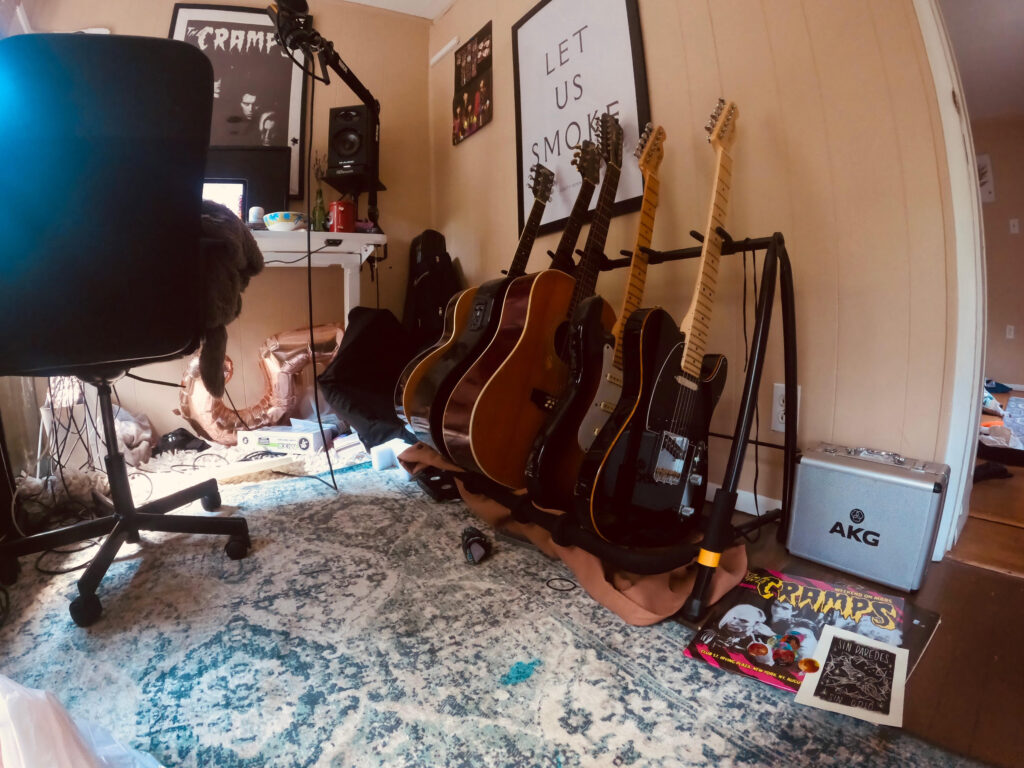
Do you have any advice for other people who want to self-record?
I think that what stops a lot of people is that they think that they can’t do it, or that they have to have a certain quality to be successful or put out a good product. But personally, I think the music is what really matters.
Most people don’t actually care about the quality of your recording. They care about the song. And I think that if more people put that focus into the writing and the songs and not so much like, “I need to make sure that my quality of the recording is this level,” I think it would change a lot of things for people.
It’s cool to record on really high-quality gear or record on analog equipment. That’s awesome. I’m not like, shitting on that in any way. I’m not like, anti-studio, but I do think that it’s just not accessible for a lot of people. I don’t think that that should stop people from making music. I think that if you want to self-record, you definitely can find ways to do that. You can record voice memos, you can get a little Zoom recorder and make a whole album with that, really, if you wanted to.
Like, Daniel Johnston, he was such a good example of somebody who did stuff like that. He made outsider music. He wrote really good songs. They were so unique and so artistic. He would record cassette tapes and every cassette tape was different. And he would sell them at shows and things like that. And people loved that. It’s all about the art, I think.
Oh yeah, with Daniel Johnston, on Hi, How Are You?, he actually dropped the tape recorder he was using and it made it so that the first half was higher pitched than the rest of the album. And it didn’t affect anybody’s enjoyment of it! It still became a cult classic even with technical errors.
Yeah! People are really endeared to that because it’s unique and it’s really personal. And I think that that appeals to a lot of people. I think it reaches something in people’s souls that is sometimes missed when you get caught up in making sure everything sounds extremely pristine.
I wanted to ask you about your Tiny Desk Concert submission. What was singing in a tub like?
That was fun as shit. Singing in the bathtub was cool. I’ve never done that before. That was so funny because…okay, we originally were not going to do that. We decided like, two days before the deadline. Me and [drummer Adam Shumski] and Erik had previously discussed it and we were like, “nah, we’re not going to do it.” But then we kind of just thought, “well, there’s no risk. It doesn’t cost any money. Let’s do it!”
We used a GoPro and a phone – I think we had three cameras set up total. That was at Erik’s house, in his bathroom. Adam was really great with placing everything, he’s really good with visual stuff. And then Erik and I both have a bunch of bird things – his grandmother gave him a bunch of bird stuff and my grandmother gave me a bunch of ducks. So we combined our Granny fowls and used them as props. And then we were like, let’s do “Tromping the Duck” because we have all these fucking ducks and shit.
We did a couple of takes and we ran it through the interface, and we had all these wires going out of the bathroom into Erik’s office. And then over the next two days, we edited the video and all that stuff…and then almost missed the deadline. We submitted it at 11:30 p.m.
You got, like, a whole cello in the shower, right? It was a cello, right?
It’s an upright bass! Which is not usually part of the lineup, but it just felt right.
That’s such a fun place to put it. The biggest instrument that you all have, shoved into the tiny shower.
Yeah, it was really cool. Oh, and there was a window right next to the bathtub, and so I had all these little ducks and whatever up there, and I kept accidentally hitting them. We kept part of that, the B-roll at the end of the video is me like, knocking over these ducks with my guitar. I was feeling a little clumsy, but I felt cool. I felt like The Monkees.
Can you walk me through your studio set up a bit?
Yeah! Okay, so I have a sit stand desk because my back is thrashed. I have an Apollo Twin interface. I also have a record player on my desk that’s hooked up to the speakers, because I think it’s important to listen to records in the space that you’re mixing and recording in.
I have this really cool Lafayette amp here. It’s like, mad broken, because every time I turn it on and nudge it even a little bit it gives you feedback. But it’s cool. It’s like, from the 70s, it’s got a very warm sound. Sometimes I will use that wild feedback sound for recordings because it’s just cool. But for gigging I would never use that because it would just sound awful!
Right now, I have an AKG C414 microphone that I use for vocals. It’s great on a lot of stuff. I’ve recorded drums with it. Like, I used it for overheads. It’s just a really solid microphone. This was a nice investment for me. Let’s see what else I have…
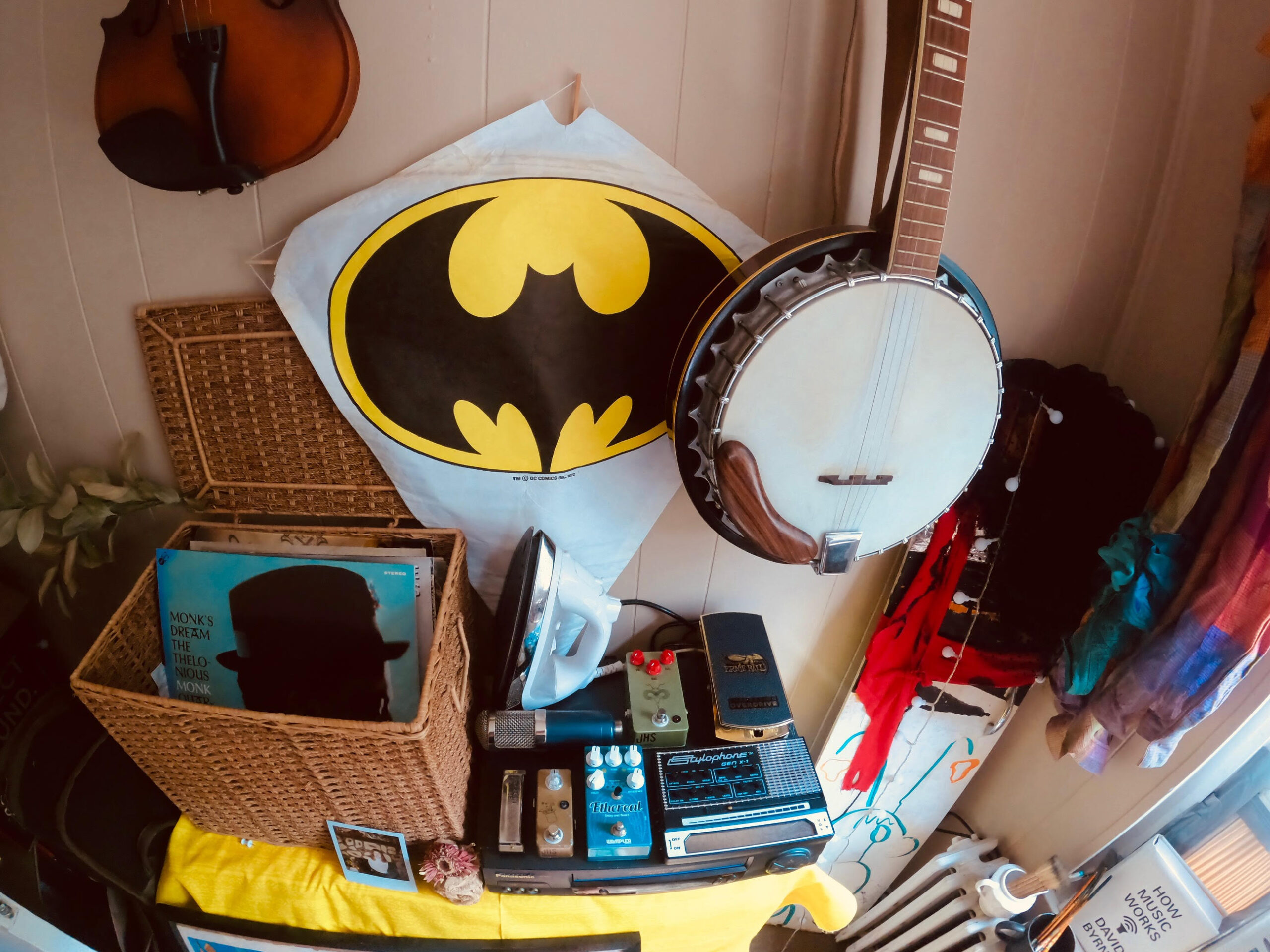
I have a banjo that I was actually able to use for the first time in a long time on this sound design project. I was composing this five-minute-long short film that a poet wanted music for. I did that with my colleague Jen Pague, who has a business called Cathead Noise, and I worked with her on a lot of projects. She’s awesome. She’s from Philly, and she has a band called Vita and the Woolf. She lives in L.A. right now, so we collab on a lot of projects. I also have this really nice…wait, am I going too much into my gear?
No! I love this!
Okay, so I have this really nice Guild acoustic guitar that I need to replace the strings on. I really love Guild guitars. I haven’t been able to use this in a while because the strings are so old. But this has traveled with me for basically my whole life. This was my dad’s guitar and he gave it to me… probably like ten years ago. So it’s moved around with me. It’s been in Philly, it’s been in Ohio, it’s been in California…
Oh, hang on a second. Is that a violin back there?
Yeah, that was my brother’s violin. I messed around with some cool distortion on that. I like to experiment with getting different distortion sounds with my recordings. So, I used a piece of metal or something on it.
You’re uh, not supposed to do that so, I’m sorry, violin players. But it’s not an expensive violin! I recorded it on this microphone and I just ran it through some distorted plugins.
I feel like that’s something you wouldn’t be able to fuck around with if you were doing professional studio time with a producer. They’d be like, “please don’t do that to our violin!”
I know! I know! But, you know what? I’m so inspired by Sonic Youth. I think they were so instrumental in finding new ways to distort things. They would do stuff like that all the time. So, I definitely take a lot of cues from them. And they have their own studio in New Jersey! It’s private, though.
I also have this Korg Krome EX Workstation. This is my keyboard station and I do a ton of stuff on it. I don’t use this for live stuff anymore, but I record with this a lot. Those are the main recording things that I have.
But then I also like to have different gadgets with me . Like, okay, this is not mine. This is Erik’s. But I have this Roland SP-555 sampler pad. You can run your microphone through it. You can do samples on it, too. I used this last night for a gig. I used this kazoo and I ran it through some delay and a couple of other things on here. And so it kind of sounded like this distorted, delayed wah pedal effect. I was also singing through it. So I was able to create some cool ambience with that. But I love having gadgets like this because, you just never know! Sometimes you just need to grab a kazoo, and all of a sudden, your song is a banger!
I saw a video of you using an iron on a guitar. Is the famous iron in here?
Yes! I have that here. My iron. That was the first time I’ve done that live. This is just a really old iron that I had and I was thinking about taking it apart and seeing if I could turn it into some kind of instrument or art project or something. But then I was like, “oh, there’s this really cool metal on the bottom.”
I mean, I didn’t plug it in because that would just like, completely destroy my guitar. But I realized that if I plugged into a distortion pedal – it’s called The Pollinator – so I ran my guitar through this and bumped up the fuzz completely. And then I turned up some echo or something on the amp that I was using and then I played it like a slide, and like a pick too. It just creates this very cool sound. I did have to change my strings after though. I completely shredded them.
What else do I have… I have this old VCR back here that I’ve been experimenting with. I love finding things like that, like electronics that aren’t used for music, but you can turn them into instruments. You can turn it into a synth! I was working on a project where I was just recording the sounds of the VCR and then I was like, distorting them in Logic and reversing them and doing different things.
I also have this…hang on, I have to turn the camera around for you to see this.
Oh man. I’m excited.
I have this rock right here.
Oh, a rock. That’s not what I was expecting. A rock?
Yeah, I have a rock. I feel like I really built that up. It’s really just a rock. But!
It’s from this place called Ringing Rocks Park. It’s this park in Pennsylvania that’s full of rocks, it’s like a field of rocks. And if you hit this with a hammer, it rings a note. I don’t think I was actually allowed to take this with me…
I took my recording set up there and I recorded a bunch of different tones of the rocks, and then I recorded them all into Logic. Then I basically just distorted them and made a song out of them. And it sounds so cool! It sounds like rain! It sounds like the atmosphere! One of them sounded like a sitar. I love doing things like that.
I think that everything makes music. I kind of look at things like that where nature is music. Everything around you is music. Even if it’s not musical, if it’s sound, it’s part of music. I think you can really make it out of anything. You can make music from a rock, you can make music from a VCR.
Anything you’ve got in the pipeline for this summer?
Right now, I feel like I’m about to explode because I’ve had these songs for two years and I’m just like, I need to get them out. So new music’s coming up for me.
Oh, and there’s Sweet Juice Summer Fest! It’s a queer feminist summer fest. It’s at Rigby Mansion on July 31. I’m sick of all dude music festivals. And I was like, fuck this, I want to organize one with all my friends. And it’s just going to be queer and yeah, it’s going to be awesome.
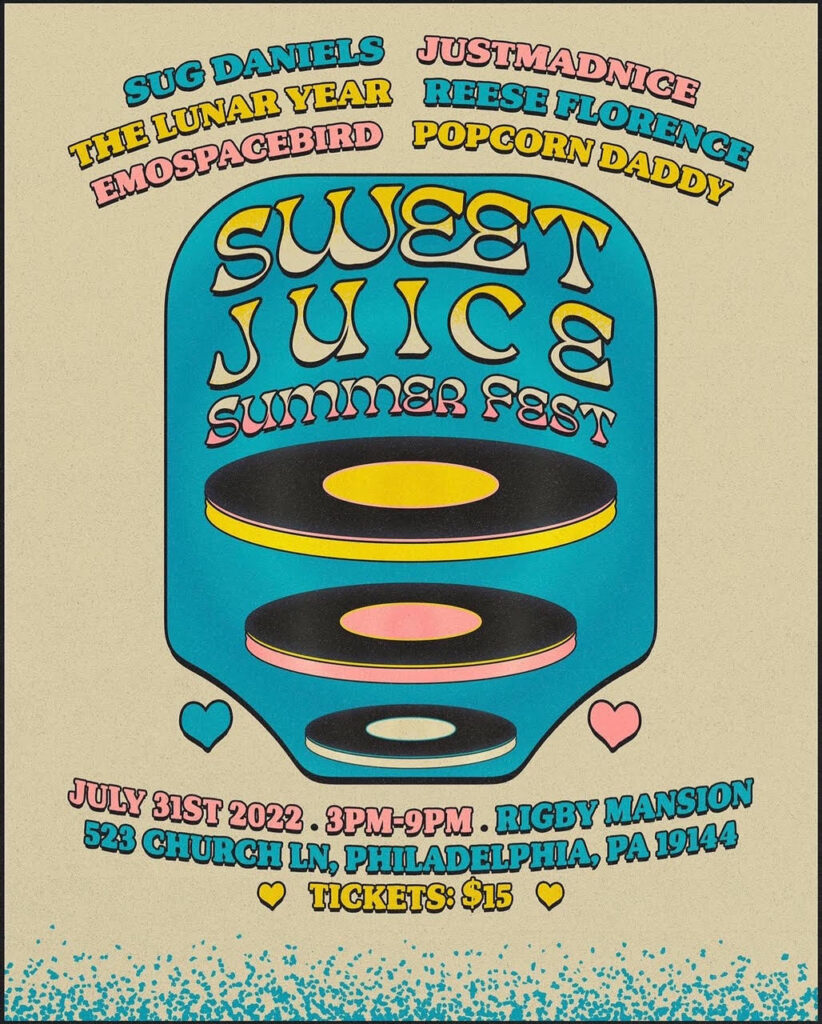
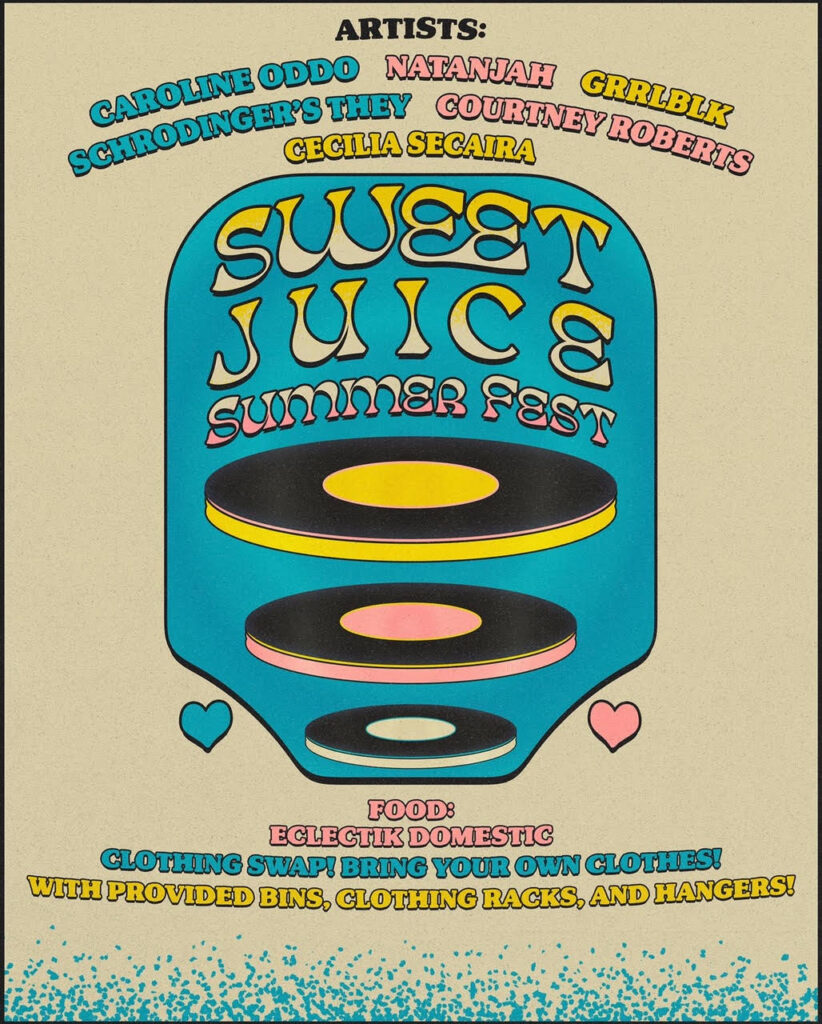
Follow The Lunar Year on Twitter and listen to them wherever you get your music. Also, check out Sweet Juice Summer Fest! Follow their Twitter here and get your tickets for July 31st here.

